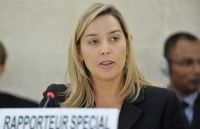One of the main concerns the Special Rapporteur raised on her return from Qatar – where she met with a number of government officials from the executive, members of the judiciary, lawyers, as well as representatives the Qatar International Court and the National Human Rights Committee (NHRC) – is the fact that the Supreme Constitutional Court, established by law in 2008, is still not functioning, making it "impossible to appeal the constitutionality of laws in Qatar."
The lack of independence of non-Qatari judges
Another issue of concern, Mrs Knaul pointed out, is the fact that many judges serving in the Qatari judiciary are recruited on a temporary basis, thus making their independence a complex issue. Raising this issue in its July 2013 submission in view of Qatar's 2014 Universal Periodic Review (UPR), Alkarama explained that since these judges "generally originating from other Arab countries are directly appointed by the executive, their residency status could constitute a serious hindrance on their independence and capacity to exercise their functions serenely." As a consequence, "the tenure principle of judges, which is essential to the independence of the judicial system, cannot be guaranteed under these conditions."
The violations of fair trial guarantees
The Special Rapporteur was also particularly alarmed by allegations of violations of due process and fair trial guarantees described during her visit, especially in cases of State security or "terrorism," as the guarantees against arbitrary arrest and detention prescribed in the Code of Criminal Procedure do not apply to persons arrested under these charges. In such cases, "persons can be detained for lengthy periods of time without charge and fundamental safeguards, including access to a lawyer or the possibility to challenge the legality of the detention before a judge," she said. Moreover, crimes prescribed under State Security and Terrorism Laws are vaguely defined, defying the principle of legality.
The lack of equal access and the flaws in the administration of justice
Mrs Knaul also pointed out that court proceedings lack transparency, as some hearings are held in closed session without justification and lawyers have serious difficulties in gaining access to information, especially during the investigation phase of criminal proceedings. The Special Rapporteur further expressed concern over reports that non-Arabic speaking defendants not always receive translations and may be forced to sign documents – including, in one case, a confession – that they do not understand.
Regarding the prosecution services, the UN expert received information according to which they were influenced by high-level persons or powerful businesses, which blurs the distinction between private and State interests. She was particularly alarmed over "allegations about the complicity of prosecution services in the fabrication of facts or tempering of evidence in certain cases. The prosecution office also seems to have complete discretion when it comes to the cases it takes up or not. This has led to irrational instances where the prosecution was pursued even when the evidence pointed to the fact that no crime had been committed."
Qatar's responds that Knaul's report lacks "objectivity, transparency and non-selectivity"
During the presentation of the report before the UN Human Rights Council (HRC), the Qatari State the delegate strongly emphasised the positive aspects mentioned in the Special Rapporteur on the Independence of Judges and Lawyers (SR IJL), Gabriela Knaul's report. Commenting on the flaws identified by the Special Rapporteur, the representative affirmed that Knaul had adopted "a monitoring and severe criticism approach based on personal conclusions, not supported by any objective facts or evidence," and concluded that "the report lacked objectivity, transparency and non-selectivity."
"The denial of the UN expert's objective comments can only serve to increase concerns with regards to the independence of Qatar's judiciary," stated Radidja Nemar, Alkarama's Regional Legal Officer for the Gulf. "Among others, Alkarama will continue to press the State to take the necessary measures to guarantee the tenure of judges by providing the Supreme Judicial Council real authority in order to ensure the independence of all magistrates, including non-nationals."
For more information or an interview, please contact the media team at This email address is being protected from spambots. You need JavaScript enabled to view it. (Dir: +41 22 734 1008).
 Algeria
Algeria Bahrain
Bahrain Djibouti
Djibouti Egypt
Egypt Iraq
Iraq Palestine/Israel
Palestine/Israel Jordan
Jordan Kuwait
Kuwait Lebanon
Lebanon Libya
Libya Mauritania
Mauritania Morocco
Morocco Oman
Oman Qatar
Qatar Saudi Arabia
Saudi Arabia Sudan
Sudan Syria
Syria Tunisia
Tunisia United Arab Emirates
United Arab Emirates Yemen
Yemen Other Countries
Other Countries




